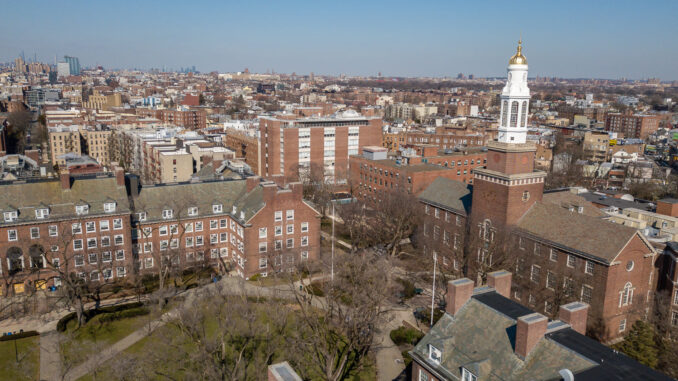
By Daniel Afanasyev
An economic impact study found Brooklyn College to have added $2.6 billion in income to the New York City economy, reinforcing it as an important socioeconomic force in the region.
The study was conducted by Lightcast, a company specializing in labor market analytics, along with data from the 2021–22 fiscal year academic and financial reports, and industry and employment data from the U.S. Bureau of Labor Statistics and U.S. Census Bureau.
According to data from the 2021-22 fiscal year, BC’s payroll and operations spending added $284.6 million to the regional economy, and employed 2,514 full-time and part-time faculty and staff. BC alumni currently employed in the NYC area have had the greatest impact on NYC’s economy, generating $2.3 billion in added income, an equivalent of supporting 17,482 jobs. Through the expenditures of relocated and retained BC students, the NYC economy saw an addition of $52.1 million in income. The study also highlights the school’s influence on out-of-state as well as retained students.
“Around 8% of students attending Brooklyn College originated from outside the region in FY 2021-22, and most of these students relocated to New York City to attend Brooklyn College,” the report read. “These students may not have come to the region if the college did not exist. In addition, some in-region students, referred to as retained students, would have left New York City if not for the existence of Brooklyn College.”
With rankings of No. 1 in diversity and No. 8 in social mobility this year according to the U.S. News & World Report, the study’s findings reflect the highly diverse region BC continues to serve and invest in.
“Investing in Brooklyn College is a win-win for our communities and our students. Our world-class staff and faculty not only equip students with the tools needed for personal success but empower them to contribute significantly to the regional economy,” BC President Michelle Anderson said in a press release on Oct. 4. “We are proud to be one of the leading institutions for social mobility and to be a beacon for young people looking to receive an unparalleled, affordable education.”
Aside from BC’s notable contribution to the local economy, the study also highlights students’ great return on investment and increase in social mobility. According to the study, the average bachelor’s degree graduate from 2021-2022 will earn $41,000 more than a person only with a high school diploma; For every dollar a student invests in BC, they will receive a value of $7.30 in higher future earnings, amounting to an average annual return rate of 21.7%. Taxpayers also reap a benefit from investing in BC; for every dollar invested, taxpayers receive a value of $3.70 over the course of the students’ working lives, an average annual return rate of 8.9%.
Long regarded as a pivotal institution to the region’s working class population, BC depends on regular public funding from the state to remain advantageous for its stakeholders. Local leaders, recognizing the benefit and force of such regional institutions, continue to advocate for increased state funding for BC and CUNY as a whole.
“With so many young New Yorkers, particularly students of color and children of immigrants attending Brooklyn College, we must continue to invest in institutions like these that play such a critical role in advancing economic and social mobility,” Brooklyn Borough President Antonio Reynoso said in the Oct. 4 press release.
